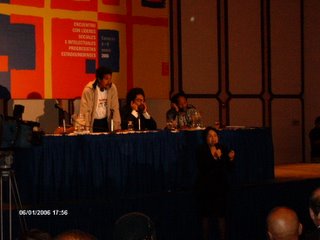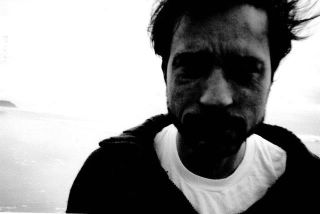I was so lucky to have just arrived back in Caracas earlier last week. I had been wondering whether or not to go to the Venezuelan coast and try to find a cheap place to kick back for a few days while I`m waiting for the World Social Forum; or go ahead and go back to the city, even though that meant staying in a bachelor-pad-like cheesy love hotel (All of the cheap hotels are "love hotels" here in Venezuela, meaning that they do most of their business by the hour.) But going back to the city, I knew, was the only way to try to get accommodations arranged for the KBOO and TV set people who will come to VZ for the WSF, try to get my equipment fixed, try, above all, to acheive the elusive quest of meeting a Chavista.
You see, while I spent a month in Valencia, I met a lot of really nice people and taught English to them. But they are business owners, people who work for auto companies, former oil company employees... they all are pretty well off, they`ve been to Miami before... and they hate Chavez. They fear and loathe him. And though the folks I spoke with are not at all crazy, I often felt that we reached the point where it became difficult to have a rational discussion with them about Venezuelan politics. More than one person mentioned the desire to leave Venezuela and move to the United States. More on all this at some other time. The point is: as people from the United States, whatever our humble background, if we come to Latin America, we are automatically in the upper class. And that`s especially true here in Venezuela, where there is a lot of money, and a lot of resources, and a significant middle-upper middle class. We privileged folk don`t automatically get access to the poor 80%, living in the barrios, they are kind of roped off. It doesn`t give you instructions in the Lonely Planet to get to the ranchos (as the poor parts are called in Venezuela).
Anyway, I woke up and turned on the TV (I watch TV in Latin America, in the hotels, because it`s one of my best sources for constant language practice), and found out from the state controlled media source, which I quite enjoy, that Evo Morales would be in the National Pantheon THIS MORNING.. ASISTE! ASISTE! (which means, ATTEND, ATTEND!). So I did as I was told.
It was pretty interesting, I was within 500 ft of Hugo Chavez, Evo Morales, and this fellow from Peru that I`d never heard of - another leftist candidate in their upcoming elections, Ollanta Humala. I got some good pictures, and after hours of being too chicken to interview people, I finally screwed up my courage, and here`s a little bit of translated words from the mouths of Chavez supporters:
> > ----> > MALE: We´re here to receive the president of Bolivia and compañero Evo Morales - which vindicates history`s truly wounded people of this land, the ones who were here first. Evo Morales represents more than 500 years of history, he represents the clamor, the tragedy, the pain... but also the hope of many generations; hundreds of thousands of human beings throughout the lands of Latin America. This is an historic meeting, it signifies, in the first place, the solidarity manifesting in the world for the Venezuelan revolution as an historic Bolivarian process. And from that, the perspective that they have in Venezuela is to bring support to the Bolivian people: for example, Venezuela has promised Bolivia to bring their new president here and recognize the will of millions of Bolivians.
> > ----> > MALE: It`s important because it underlines Latin American unity - Because the people who are resisting imperialism are increasing all the time. There are changes in South America, the integration of countries is one of them. Changes like Mercosur and Petrocaribe. We can see the cooperation of different countries to share resources. For example, one country has natural gas, another has minerals, another has petroleum. We collaborate with the countries without petroleum, and give them oil in exchange for their resources.
> > ----> > FEMALE: We`re here enjoying the welcome for Evo Morales, indigenous president who is making history in Latin America. He`s the first indigenous > president of his nation. As I understand it, as I`ve heard on TV, he has help. I hope that he can maintain his autonomy, maintain his roots. We see some Bolivarians have forgotten Bolivarianismo, forgotten their identity. I hope that Evo Morales can, in this sense, vindicate and not follow the past of losing touch with his roots as a coca farmer... coca is part of the Bolivian economy, and what some countries want to do is destroy that. I hope he can reinvigorate the economy, taking into account all the social classes in that country. He will have to be very careful, because as we`ve already heard, this Fidel, Chavez, they are "dangerous". Why dangerous? Because they listen to the voice of the people, because they listen to he voices of the indigenous? It`s like here, in Venezuela where the Chavez legislature has gotten more votes and more delegates - Morales validates the fundamental indigenous participation in the government. This is the decisive hour. The people will not be dominated by other governments.
> > ----> > FEMALE: We wanted to see Evo Morales, don`t know him personally but i`ve seen him on television... I like him a lot as a president, and it makes me happy to see the continuation in other countries of the process that is happening here in Venezuela with Chavez and the Revolution.
> > ---> >FEMALE: it`s really important, the solidarity of Latin America, now with Evo in Bolivia, now with Uruguay, Brazil; with Argentina, with Venezuela, we are going to form a strong front - not to fight against the gringos - the gringos have their own problems. The gringos, or the northamerican people, they have to solve their own problems. But together we can confront them if we have to. We aren´t afraid of the gringos coming to invade us... they`re not going to invade.
But if they do come to invade, they will encounter a front that is not just Venezuela, but also Brazil, like i told you before, now we have our friend Evo Morales, we have our friend Kirschner in Argentina who we can count on.. so, they`re not going to invade. I would like to mention something I learned today. Evo Morales is an Aymaran Indian, born from that tribe. And they have three words: Amasua, Amanquella, and Amallulla. Amasua means don´t be a thief. Amanquella: don`t be lazy; and Amallulla, don`t be a liar. This is a message from Venezuela to the people of North America: Amasua, Amanquella, Amayuya.
=========
word.

 They were here as part of the run up to the World Social Forum January 24 to 29 here in Caracas, for a conference of progressive US leaders of color against racism.
They were here as part of the run up to the World Social Forum January 24 to 29 here in Caracas, for a conference of progressive US leaders of color against racism. 
